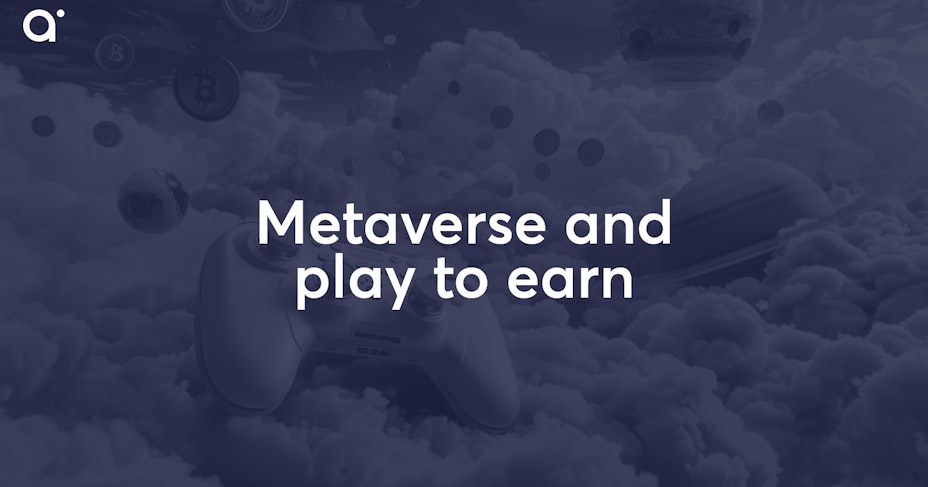Metaverse and play to earn
- 7 minute read

Metaverse and play to earn have a strong connection because many metaverse exist as games. Applications in other sectors are going by mouth. Metaverse games hold about 50% of this market and the prediction is that this share will increase in the coming time.

- The metaverse did not come out of the blue; many games have led to the marketing of metaverse
- Central metaverses have been released by major players such as Meta
- Decentralized metaverse exists in the blockchain world
- The playability of decentralized games is still somewhat poor
- The economics of decentralized games is very difficult to regulate properly
- Central players like Meta have the advantage of a well-stocked treasury when developing a metaverse
- With an avatar, you can walk around a 3d world to discover a metaverse
- With decentralized metaverses you own your in-game items, with a central player you don't
- There is certainly a future for the metaverse, but much more attention needs to be paid to the user experience
Inhoudsopgave
- Precursors to the metaverse play to earn games
- Central and decentralized play to earn metaverses
- Metaverse play to earn games and economy
- Metaverse gameplay
- The future of a play to earn metaverse
Precursors to the metaverse play to earn games
Snowfoot has created a directory of all kinds of players who want to get a foothold in the gaming metaverse or already have:
Its main predecessors were MMOG (Massive Multiplayer Online Game) and MMORPG (Massive Multiplayer Online Role Playing Game).
Features were that you walked around a 3D world with an avatar and experienced things in first person. Communication with other avatars was also an important part of such a metaverse.
Major titles included Second Life, Fortnite, World of Warcraft and Minecraft.

Central and decentralized play to earn metaverses
- Central metaverse, or games marketed by companies that do not give players a say, are represented by Meta, for example, which released Horizon Worlds. In fact, Facebook has already changed its name to Meta to reflect how important this is to them. They believe there that humans will increasingly be found in the metaverse and that this will be a huge gap in the market. They are by no means alone in this. Google, Microsoft, Roblox and others from the tech and gaming sector and Silicon Valley will also be working in this growth market. They will also want to get a piece of the pie if it gets to the point where many people will find the metaverse more important than the real physical world. We are not that far away from that, although this still seems like an exaggerated idea. We thought the same about social media. Many people are already fused to their smartphones.
- Decentralized metaverses are play to earn games that use blockchain , NFT and cryptocurrency . In these worlds, players also have a say, often through a DAO . Because of the decentralized nature of blockchain technology and the personal ownership of in-game NFTs, such a game feels more like your game than that of the provider. Also, in these games, the rules usually don't just get changed so that you suddenly have to pay to log in or something. In games like TheSandbox or Decentraland, you can walk through a 3D world and experience adventures, while by playing the game you earn cryptocurrencies or NFTs that are worth money. One drawback of play to earn games is that the gameplay and graphics can often be described as inferior. It often seems that more attention has been paid to getting the game on the market and selling a lot than on making a top-notch game like World of Warcraft or Fortnite that people play simply because it is fun. Besides historical congestion with blockchain games on the Ethereum blockchain, for example.
Metaverse play to earn games and economy
It is very difficult to create a virtual world that is appealing to everyone. This is already true with PC games, but for metaverse games this counts extra.
Playability play to earn games
If a computer game is fun enough you will soon see sales increase. This will also be true with a play to earn crypto game, then more people will start playing it as well.
Unfortunately, it is apparently enormously difficult to make a play to earn game that meets the standard of a fun computer game. Players then effectively come just to collect the rewards or speculate with NFTs without paying any attention to the in game content.
Economics of play to earn games
Also, if a developer wants people to keep coming back, you will have to rig a functioning economy in these circumstances. This is also proving to be quite difficult. Although it must be added that many factors come into play.
A player coming to make some money must earn enough crypto to find it interesting. In a bull market, this is often possible, but in a bear market, when the prices of cryptocurrency and non fungible tokens drop significantly, revenues will drop to the point that many players will drop out. What you also often see is that the first group of players and developers earn handsomely and the later players often suffer losses.
Development of a play to earn game
For developers in the crypto world, it must remain interesting to make the game better. They too will need to have revenue. Often revenues dry up quite a bit when the expensive in-game assets like pieces of land are sold. There is a risk that at that point the developers will stop doing anything because they can no longer get paid. This is the most important group, because without development, the game will collapse or maintain the same deficits.
The advantage rich companies have
With central players like Meta or Epic Games, this problem does not apply. All revenue is for Meta and the players get nothing. They get to play the game and that's it. Central players can also afford to make a loss in the beginning of a game because they have buffers of billions. Later, if enough people play along they can always change the terms.
A company like Meta eventually comes up with something to make profits if there is enough enthusiasm. Probably by selling you data and serving you advertising. Perhaps also by selling you devices that are only suitable for their game and without which you cannot play the game. Another possibility is to charge a membership fee to still be able to log in.
Metaverse gameplay
In a virtual 3D online game, you use an avatar, a digital representation of you experiencing things in the first person. An avatar is constructed with many aspects and thus unique in such a metaverse. For example, the combination of a name, clothing, and other attributes and characteristics will make your character clearly recognizable, just like in the real world. By choosing what belongs to your avatar, you develop this avatar into a self-chosen identity.
Playing with an avatar
The trappings of an avatar consist of all kinds of in game items like NFTs, such as clothes, a house, a name and other parts belonging to the avatar, which you store in a crypto wallet.
This avatar will go on adventures in a metaverse and will also usually be able to interact with other avatars, so the social aspect is an important part of your adventure. Whereas on social media you communicate with "flat characters," in these worlds you will speak with 3D characters.
Similarities of the metaverse to the physical world
This may be more imaginative, but also lead to typical problems we know from the physical world, namely location. If you want to speak again with an avatar you have established a connection with, you will have to invite it at a certain time at a certain place in the metaverse, otherwise you may only be able to send messages, as we do now with Whatsapp and the like.
It is quite possible that the problems we face in the physical world will eventually surface in the metaverse as well.
Property in play to earn games
A decentralized metaverse stores your data and processes it in a blockchain. With the advent of a Self-Sovereign Identity, you own this data and decide what happens to it, because you have the private keys in control. This is extra important because avatars reveal more about who you are, including adding body language and real-time conversations with other avatars. Google and Meta know enough about us, don't they?

Once a game gains great popularity, such as Axie Infinity, more players will start playing more often and pay more attention to the appearance of their avatar. Aspects from the real economy may then trickle down in the form of branded clothing like Nike or Gucci to embellish your avatar.
The future of a play to earn metaverse
Play to earn is a real growth market and has a good chance of becoming one of the bigger stories in the world of cryptocurrency. However, to really get big, developers from the gaming industry will have to do a better job of putting the system together so that both players and everyone else see enough light at the end of the tunnel to invest time and money in virtual worlds.
It still lacks too much in playability as well as economic rewards for participants. It's waiting for teams to set up their metaverse in such a way that they can compete with PC games, but also arrange good rewards for players that are as least dependent on volatility in the crypto market as possible. The obvious one would be to provide rewards in value-based stablecoins , otherwise the first players will be able to earn a lot and the later nothing.
Until then, we sit in a metaverse playing games that are boring, yield little and seem designed only to make developers and early players line their pockets.


